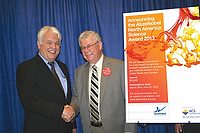Liquid Crystal Chemist Wins AkzoNobel UK Science Award

AMSTERDAM, The Netherlands - A British scientist whose work helped form the basis for flat-screen TVs, computers and mobile phone displays has won AkzoNobel's UK Science Award for 2014.
Professor John Goodby, Chair of Materials Chemistry at the University of York, officially received the honor and a £50,000 prize during a ceremony held at the Royal Society of Chemistry in London on March 5.
Having spent almost a decade of his 40-year career at Bell Laboratories in the United States - home of seven Nobel Laureates - Goodby is being recognized for the contributions he has made to materials chemistry in the field of liquid crystals and soft matter.
"I would like to pay tribute to all of my colleagues and students past and present, as well as my fellow academics at the University of York, who have made this scientific journey so exciting, memorable and enjoyable," he said. "The relatively short time span between the invention of commercial LCDs in the 1970s and their current market dominance has required a huge effort by scientists and engineers from many disciplines, demonstrating the critical importance of multidisciplinary research," Goodby noted.
Scientists are constantly looking at how the application of liquid crystals can be expanded, with current research expected to lead to applications in sensors and the medical field. More than 100 clinical trials are in progress worldwide testing the use of liquid crystals as vectors to translate DNA across membrane walls in the human body.
Looking for a reprint of this article?
From high-res PDFs to custom plaques, order your copy today!




